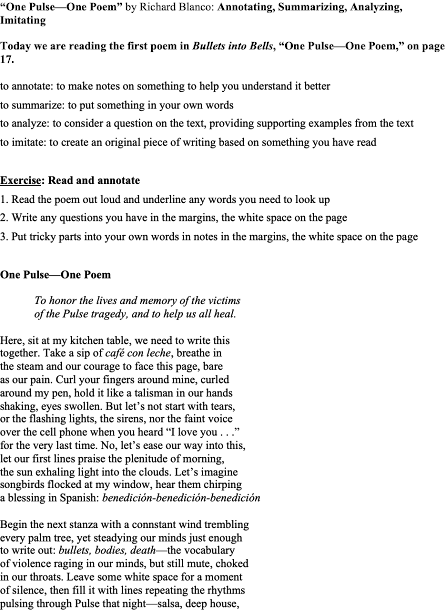Week 98: College Reading and Writing Joel Dias-Porter and Kiki Leyba
Week 98:
College Reading and Writing
Joel Dias-Porter
and Kiki Leyba: Annotating, Summarizing, Analyzing, Imitating
to annotate: to make notes on something to help you understand it
better
to summarize: to put something in your own words
to analyze: to consider a question on the text, providing
supporting examples from the text
to imitate: to create an original piece of writing based on
something you have read
We are doing the eleventh poem and response in our book today,
starting on page 33.
Exercise: Read and Annotate
1.
Read the poem and response
out loud and underline any words you need to look up.
2.
Write any questions you
have in the margins or in your notebook.
3.
Put tricky parts into your
own words in notes in the margins or in your notebook.
Exercise: Respond to Poem
Write a
response to this poem. What are your first impressions? How do you connect or
disconnect to the subject and speaker? Does the poem remind you of anything
from your own life and experience?
Exercise:
Questions for Comprehension of the Poem
1.
How do you feel about how the speaker
uses questions in the poem? What is their significance?
2.
What are the italics doing in the poem?
What do they show us?
3.
What does the speaker feel about the
nature poems at the end of the poem?
Exercise:
Questions for Comprehension of the Response
1.
Who is the “you” in the
first line of the response?
2.
What is different about the italics in the
response versus the italics in the poem?
3.
How is the perspective in
the response different from that of the poem? What effect does that change
have?
Homework Assignment: Summarize the Poem
Write a
7-9 sentence paragraph summarizing the poem with quotations, in-text citation,
and a Work Cited Page.
Example Summary: Too short, but incorporates quotation and
in-text citation:
Joel Dias-Porter’s poem, “Wednesday Poem,” starts off by
talking about getting to school to teach a lesson, but that “outside the
classroom, things are too quiet” (Dias-Porter 33). The speaker finds out that
one of their students, Maurice, “…got shot last night…” and that the other
students “sit in a circle” (Dias-Porter 33). The speaker reminisces about
Maurice, and the poem ends wondering about the future of students in a time
“where it’s natural to never see seventeen” (Dias-Porter 34).
Work Cited Page
(for today’s poem)
Dias-Porter, Joel. “Wednesday
Poem” Bullets Into Bells: Poets and Citizens Respond to Gun Violence.
Ed. Brian Clements et al. Beacon Press, 2017.
Homework Assignment: Summarize the Response
Write a 7-9
sentence paragraph summarizing the response with quotations, in-text citations,
and a Work Cited Page.
Homework
Assignment: Analysis
Question for analysis: In Dias-Porter’s poem, the speaker puts his
nature book away because “which students could these pistils protect, / here
where it’s natural to never see seventeen” (Dias-Porter 34). In contrast, Leyba
uses the word “unnatural” to describe the horrors of gun violence. What are the
words “natural” and “unnatural” doing in each piece? What is being described as
“natural” and “unnatural”? Use quotation and in-text citation to support your
answer.
Homework
Assignment: Imitation
Write your own poem where you compare something
you consider “natural” to something that is not.
Homework:
- Summary of Poem
- Summary of
Response
- Analysis of
Poem/Response
- Imitation of
Poem
About
this class:
In this class, you are welcome to submit
homework for a grade. If it’s not strong
enough to earn an A, I’ll give you some comments to help you revise it, and let
you do it over again. You have as many chances as you want to complete and
perfect the work in this class, and you are welcome to do more than one week’s
worksheet for homework at a time; ask me for sheets you’ve missed. Students who complete 15 weeks of graded
assignments and a longer paper can qualify for college credit. When you get close to completing 15 weeks,
I’ll help you get started on your longer paper.


Comments
Post a Comment